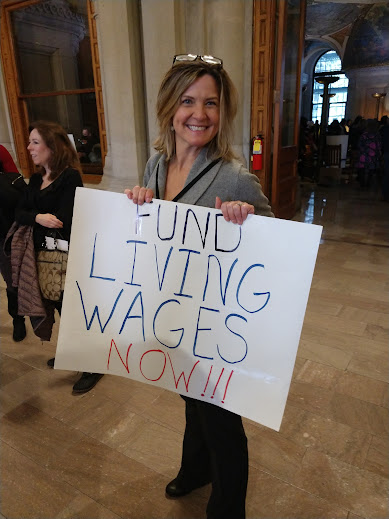
We would like to highlight Elizabeth Martin who has been the CEO of Living Resources since the retirement of Fred Erlich at the end of 2020. We had the experience of witnessing her spoken words at the New York Disability Advocates (NYDA) Rally at the State Capitol in the War Room on Wednesday, November 16th, 2022! The purpose of the rally was to enhance the pay of all Direct Support Professionals (DSPs) with a Cost-of-Living Adjustment (COTA) of 8.5%. Elizabeth also added something that was ad-libbed but was arguably the best part of her public oration! It caused the audience to relate to the situation our individuals find themselves in when there are ongoing staff shortages. Elizabeth asked us to remember the peak of COVID-19 when we were all stuck in our homes with nowhere to go and no control over the situation. This was only for the better part of a year. There are some individuals who have to deal with these realities on a regular basis when there is a high turnover rate in the human service industry and staff shortages due to a perpetual deficiency in pay.
Without any further delay, please draw your eyes to the compelling words of Elizabeth Martin!
Hello everyone, I’m Elizabeth Martin, CEO for Living Resources here in Albany. We provide a variety of residential and non-residential supports to folks with disabilities in the Capital Region and beyond.
You know, I think everyone in this state would agree that people with disabilities have a right to live with dignity, independence, happiness and be fully integrated in the community – just like everyone else. To fully achieve that vision though, you need 2 things: adequate funding and people. But I’m going to be honest with you: we do not have enough of either of those two things right now. We’re here because we want to make it crystal clear to the Governor and everyone in New York that we do not have enough funding or people to ensure individuals can live the lives they have a right to live.
Without enough funding or people, it means individuals are often stuck in their homes day in and day out because there are not enough resources or people to support them going out to socialize, have fun or volunteer or work. More than 10% of the individuals who reside in our group homes still can’t get back into their day programs because of staffing shortages. What happens when folks are stuck in their homes? They can become physically and mentally unhealthier because they are more isolated and stressed because they are not able to live the lives they want to live. Without enough
funding or people, service quality goes down and the chances of something terrible happening increases because our staff are overworked, overstressed and unable to provide the quality support they want to provide because there are simply not enough of them.
Now, our industry has been dealing with workforce shortages for years. But the pandemic and inflation have only made things even more difficult. Since the pandemic, we’ve have had periods when about 1 in 4 of our positions was unfilled. It is wonderful that OPWDD has included strengthening our workforce in its 5-year strategic plan. The idea of creating solid recruitment pipelines, career pathways and credentialing for DSPs is wonderful. But DSPs also need a respectable wage. DSPs do not have easy jobs – they act as teachers, coaches, mentors, healthcare workers, mental health workers. The work they do is actually priceless, but I think they would be happy at least earning a more livable wage. Bonuses are not enough – they need ongoing salary increases for them so we can draw in and keep more people in the profession. Agencies like ours are not sitting on huge profit margins that allow us to give substantial wages increases to 75 – 80% of our workforce. And we don’t set our prices – the state does. That’s why we need to the state to help us with this by investing in salary increases for our people.
But we also need adequate overall funding, which we don’t currently have. High inflation has financially hurt our staff and the rest of New Yorkers, but it has also hit nonprofit providers hard as well. Since just last year, the non-personnel costs in our supervised residential programs have increased by more than 25%. The biggest drivers of those increased cost? Transportation costs, energy, food, maintenance. Oh, and our health insurance premiums will be increasing by double-digits next year, too. So, in addition to investing in the workforce, we need the Governor to include an 8.5% rate adjustment so that we can keep up with the overall rising costs of operating homes and other programs.
As I mentioned, we need both funding and people to have a strong support system for New Yorkers with disabilities. We need the state to invest in both.



 What comes after graduation? Many College Experience students, in fact most, choose to remain in Albany. They maintain friendships with their fellow and former graduates, form romantic partnerships, and some get married.
What comes after graduation? Many College Experience students, in fact most, choose to remain in Albany. They maintain friendships with their fellow and former graduates, form romantic partnerships, and some get married.